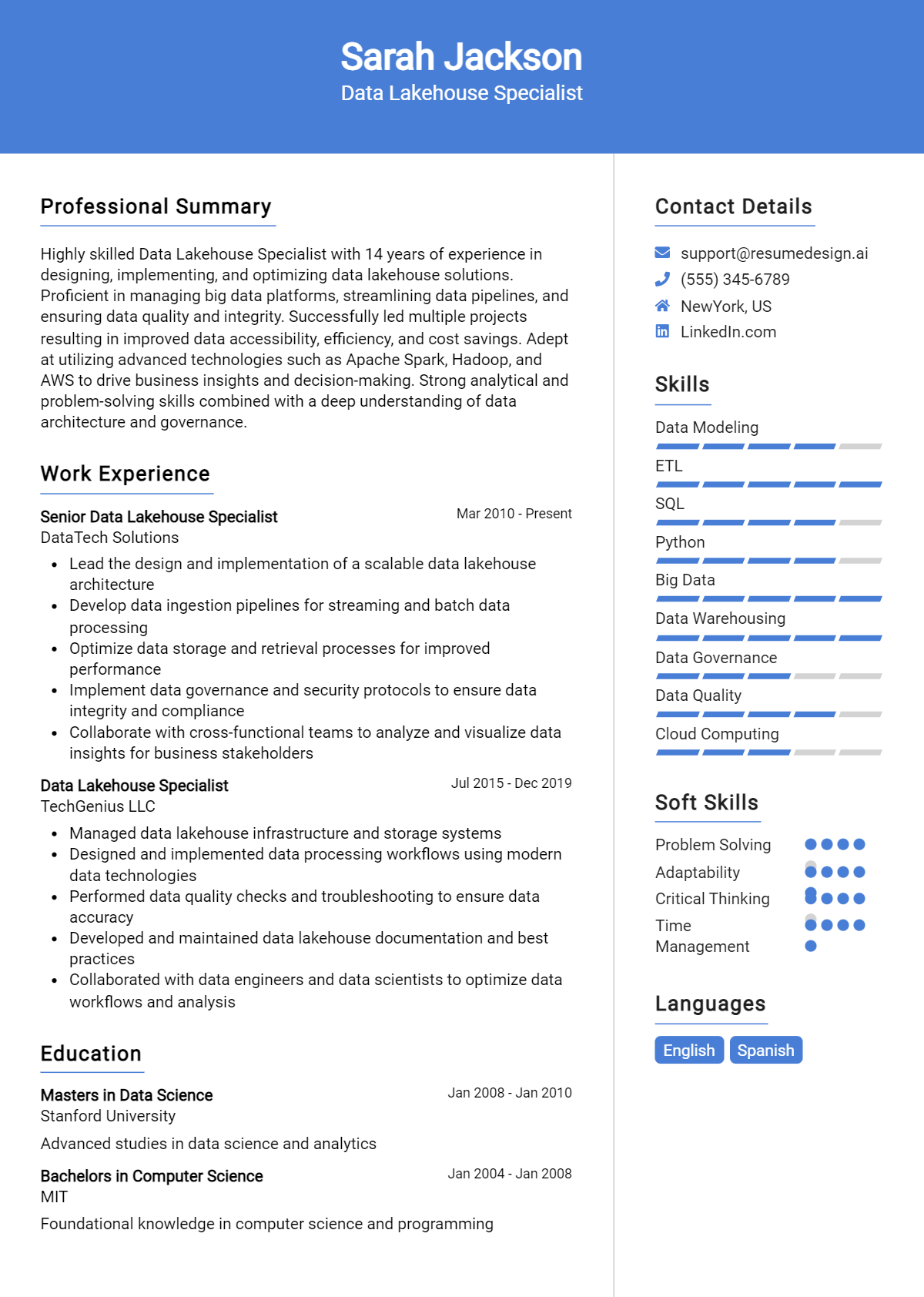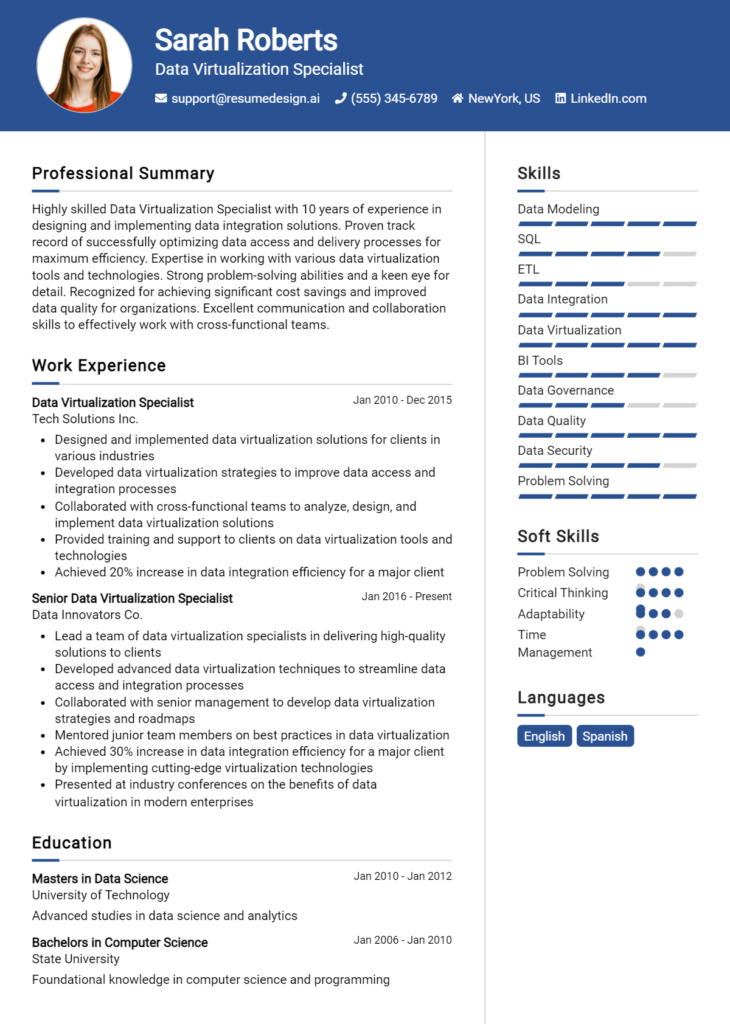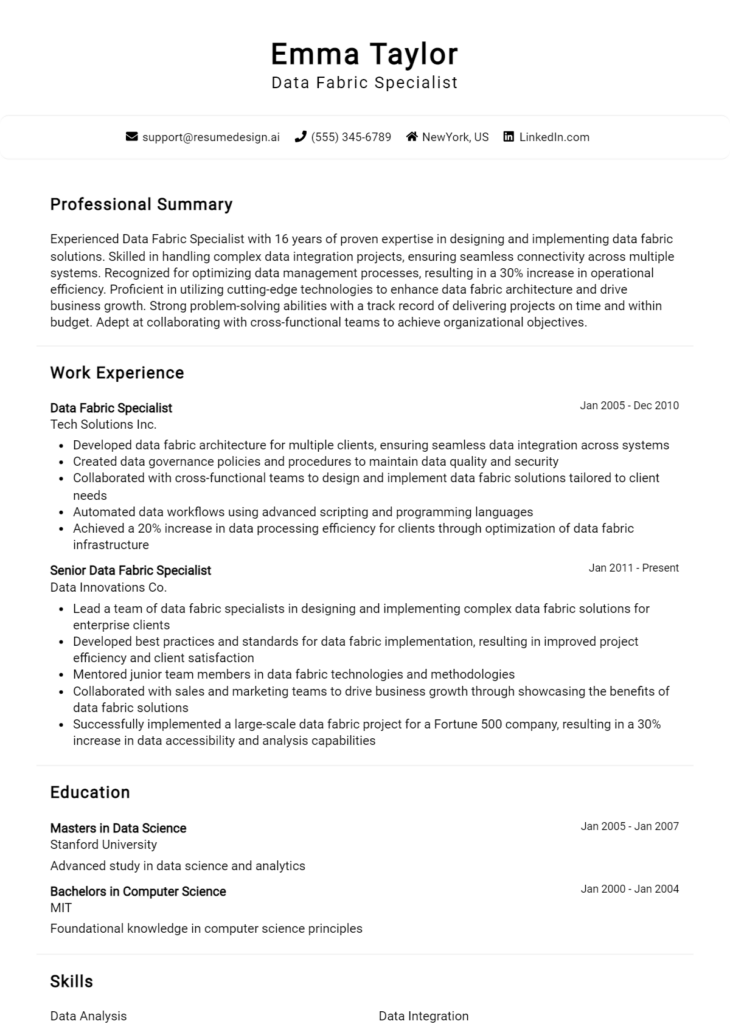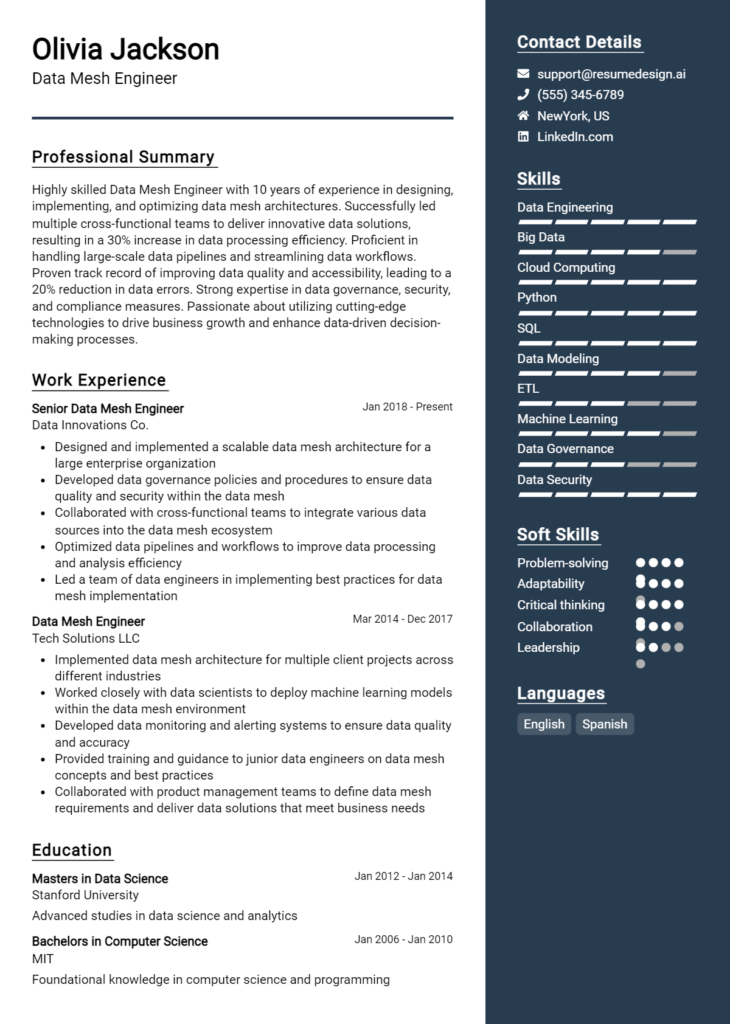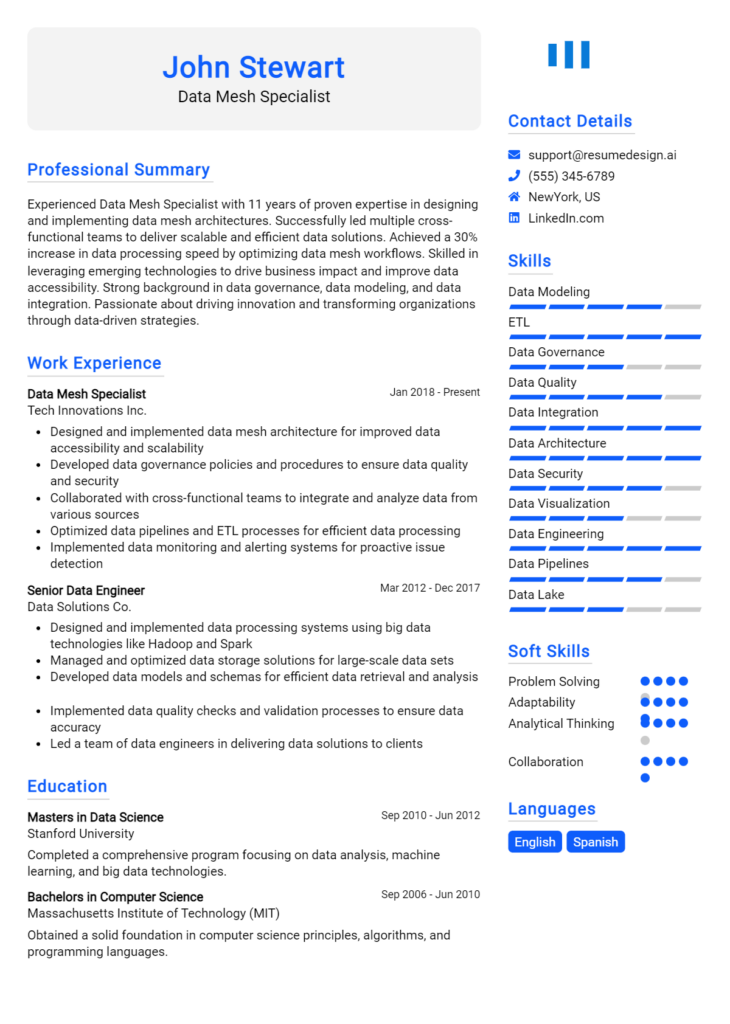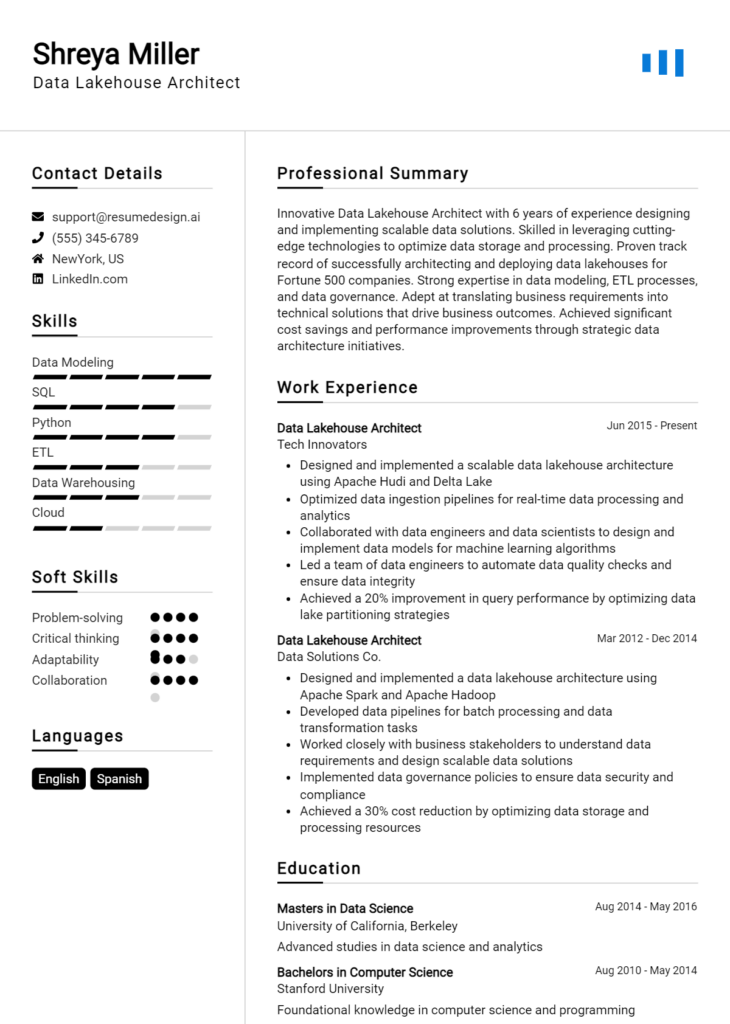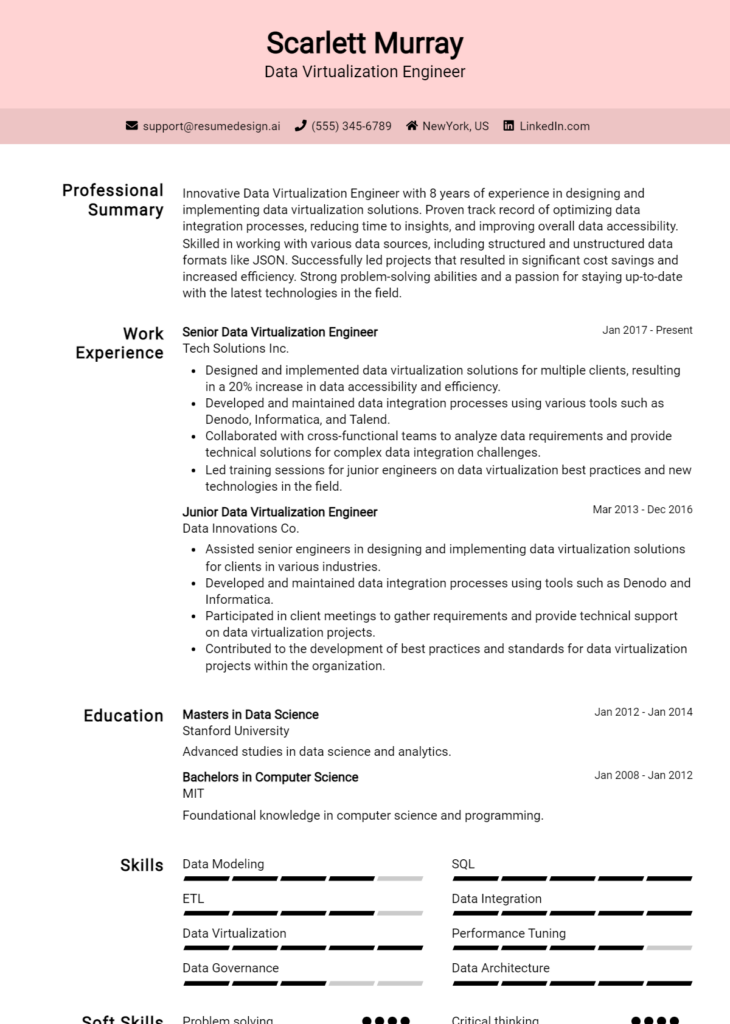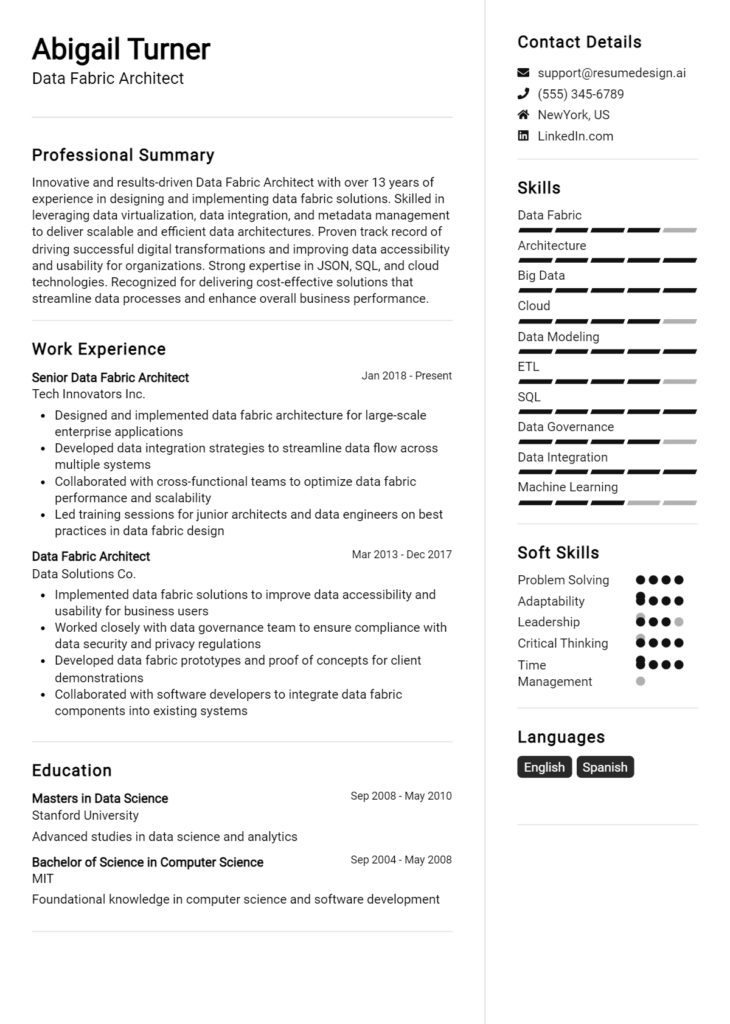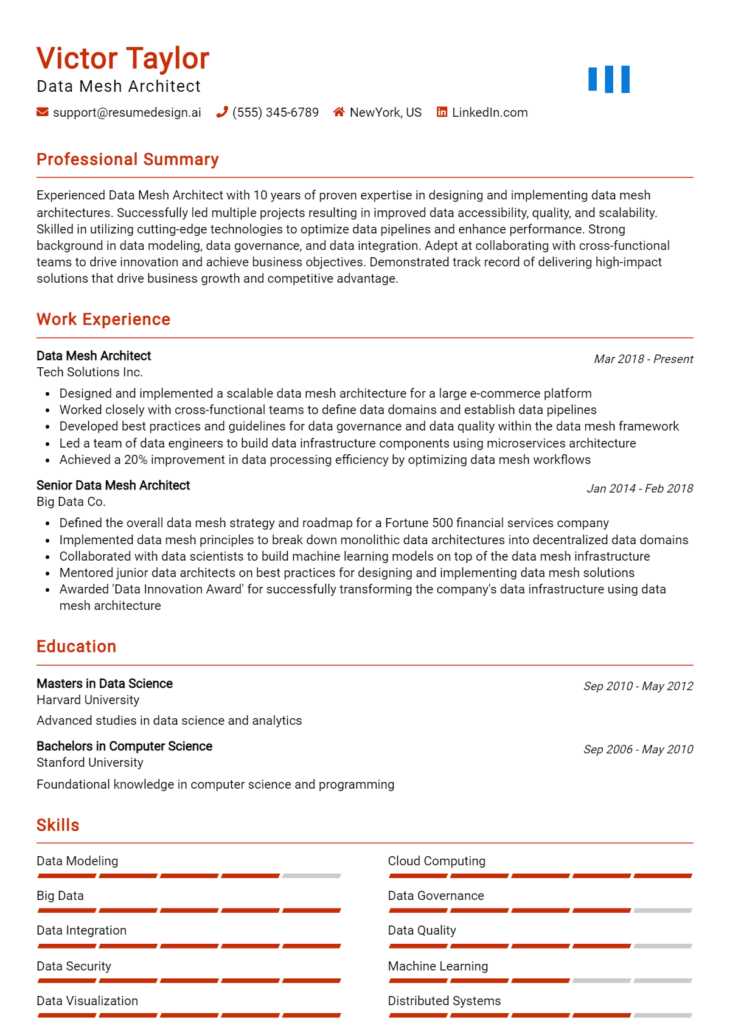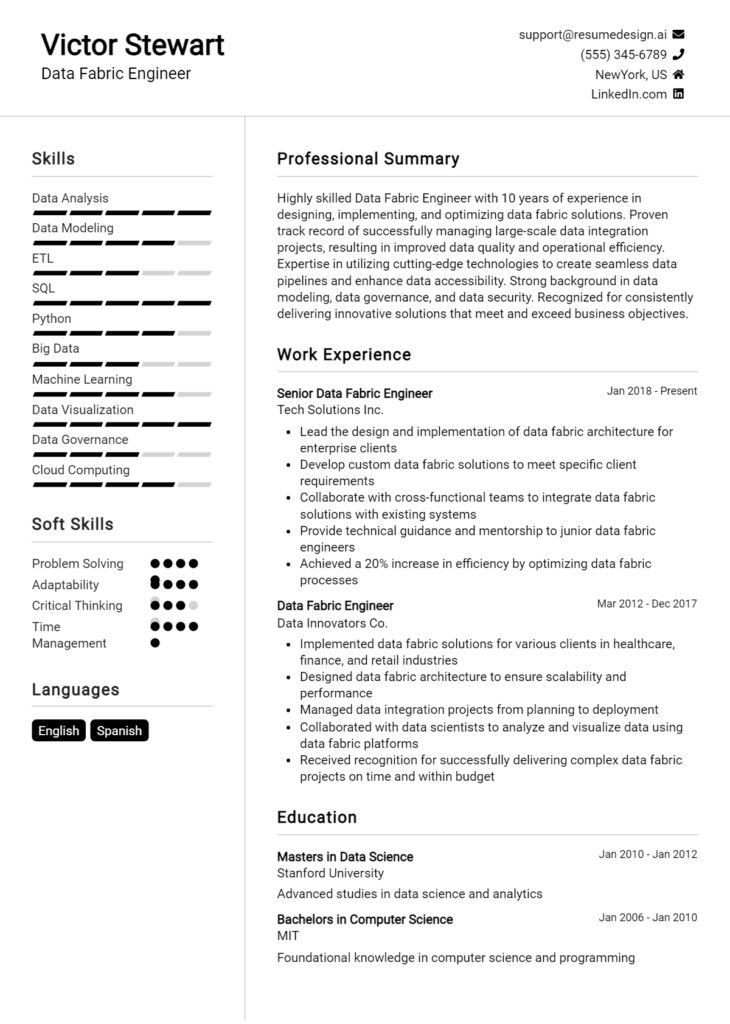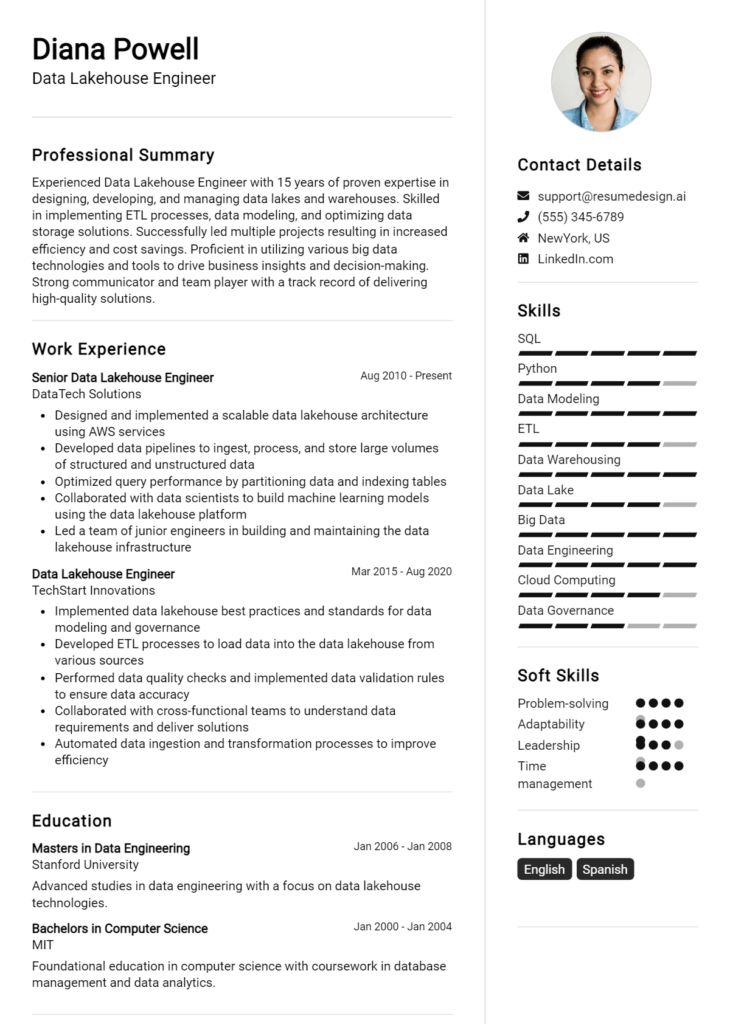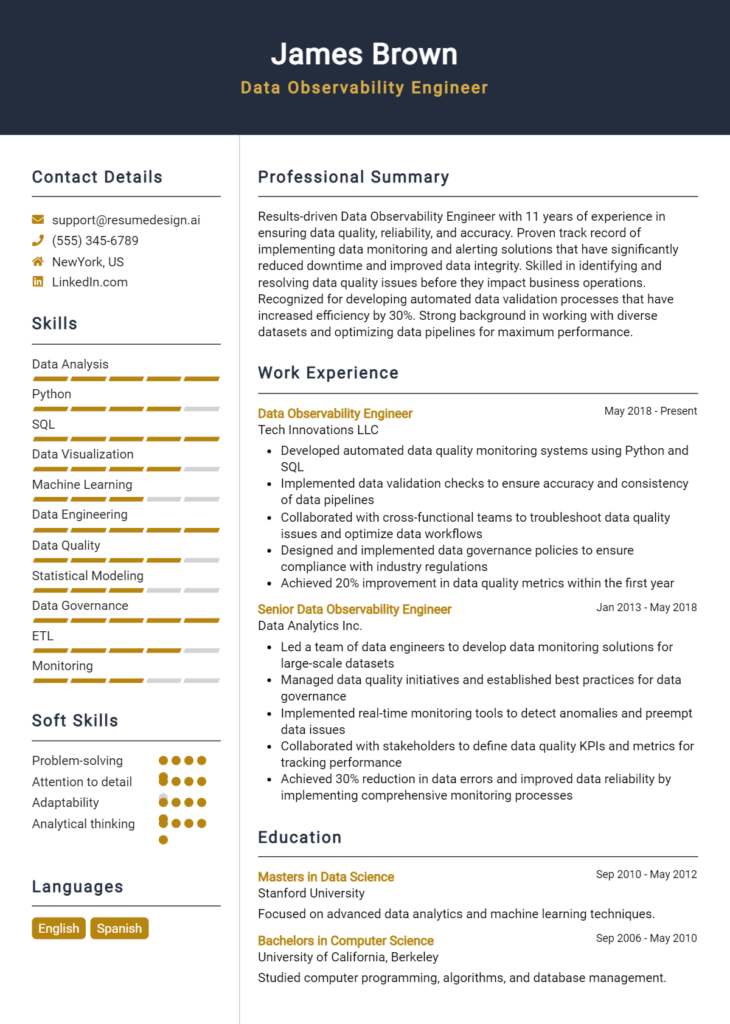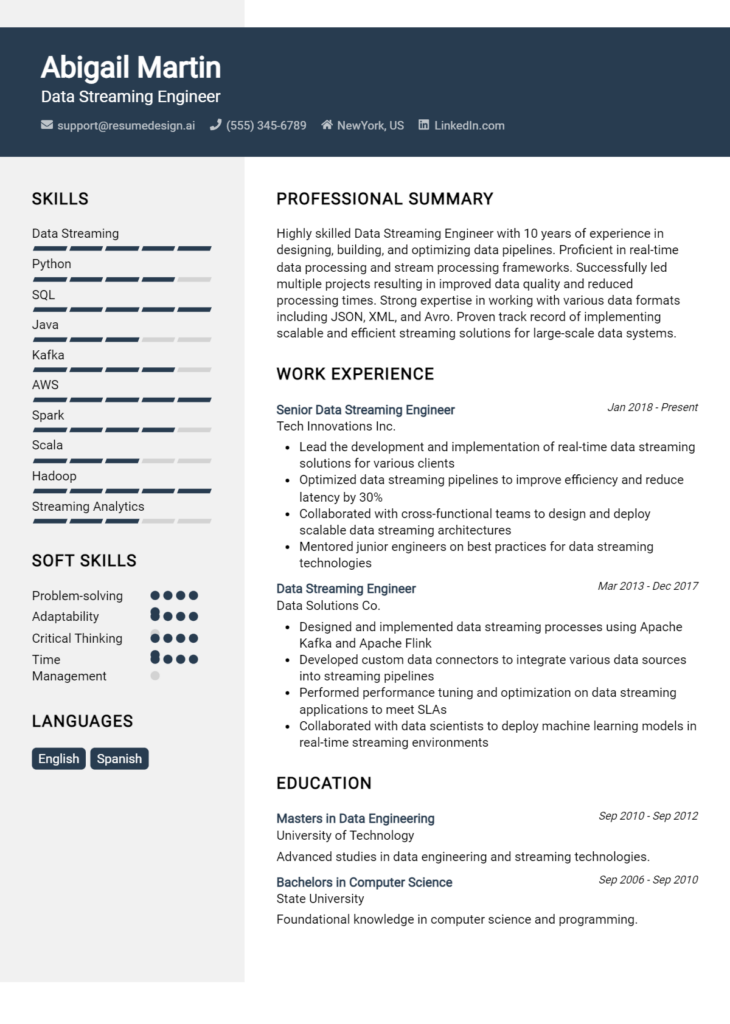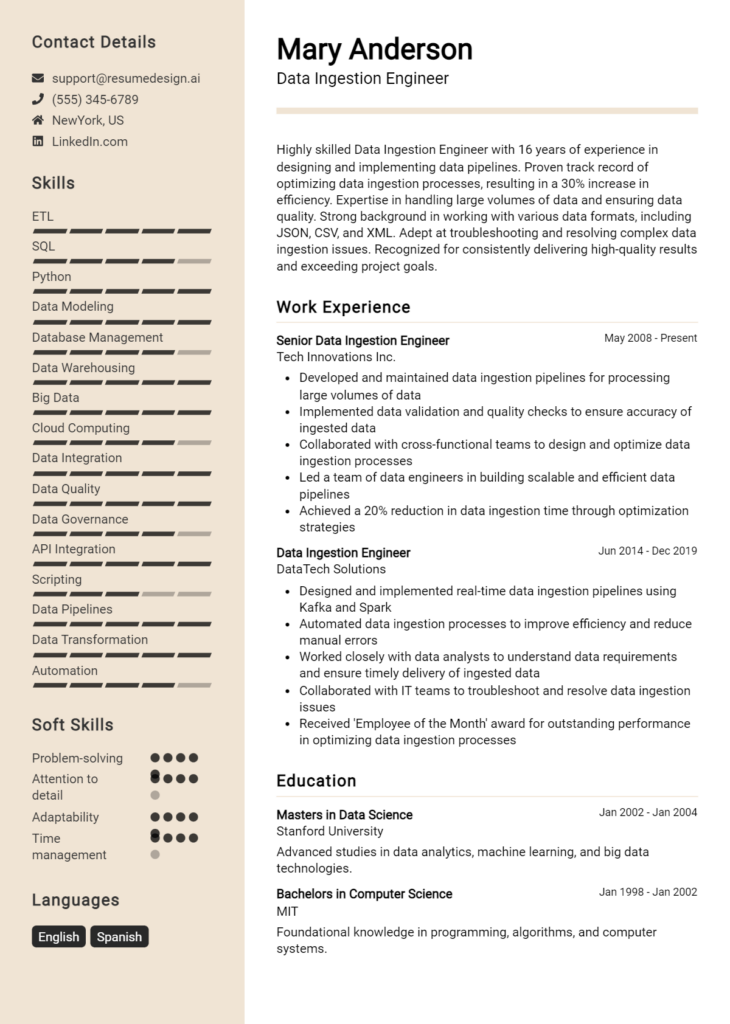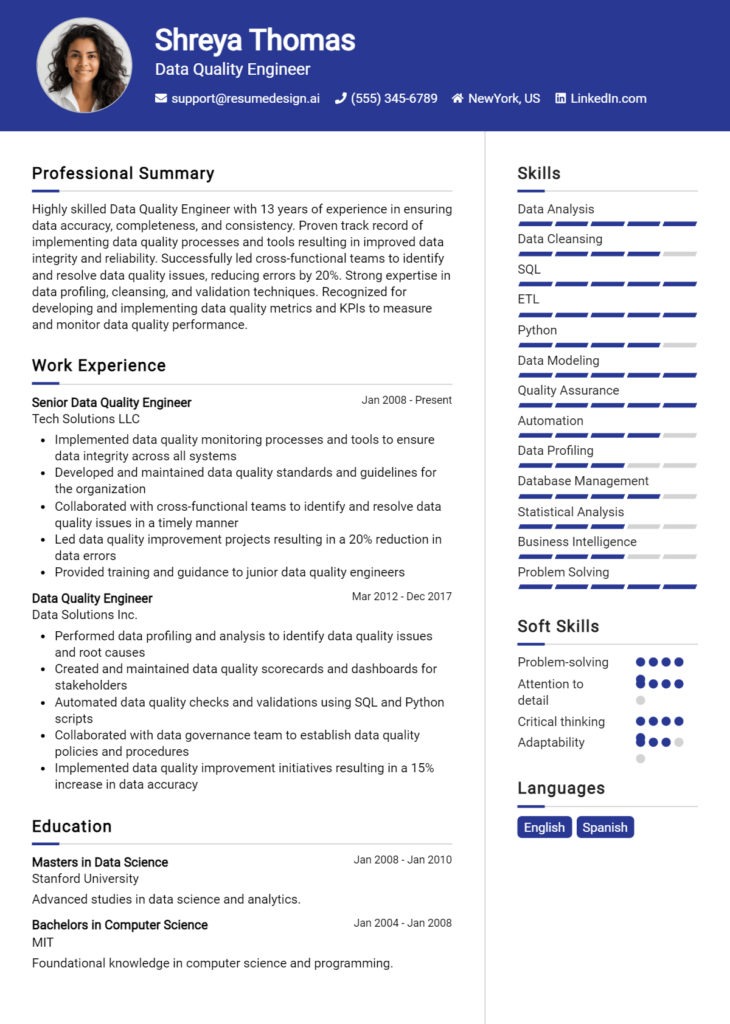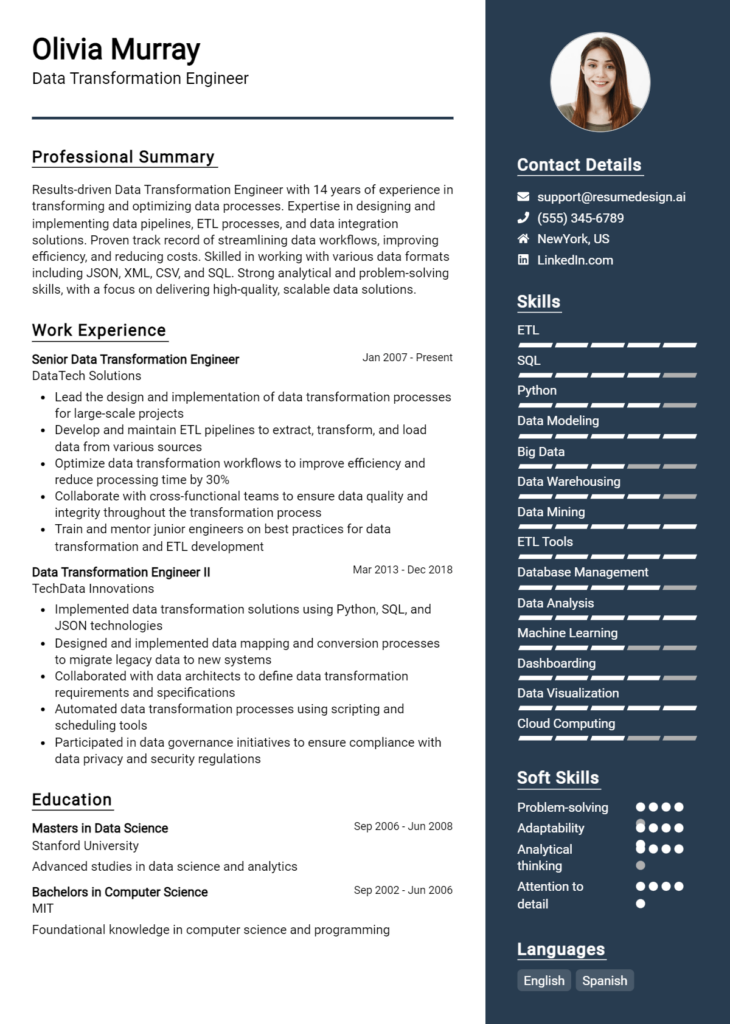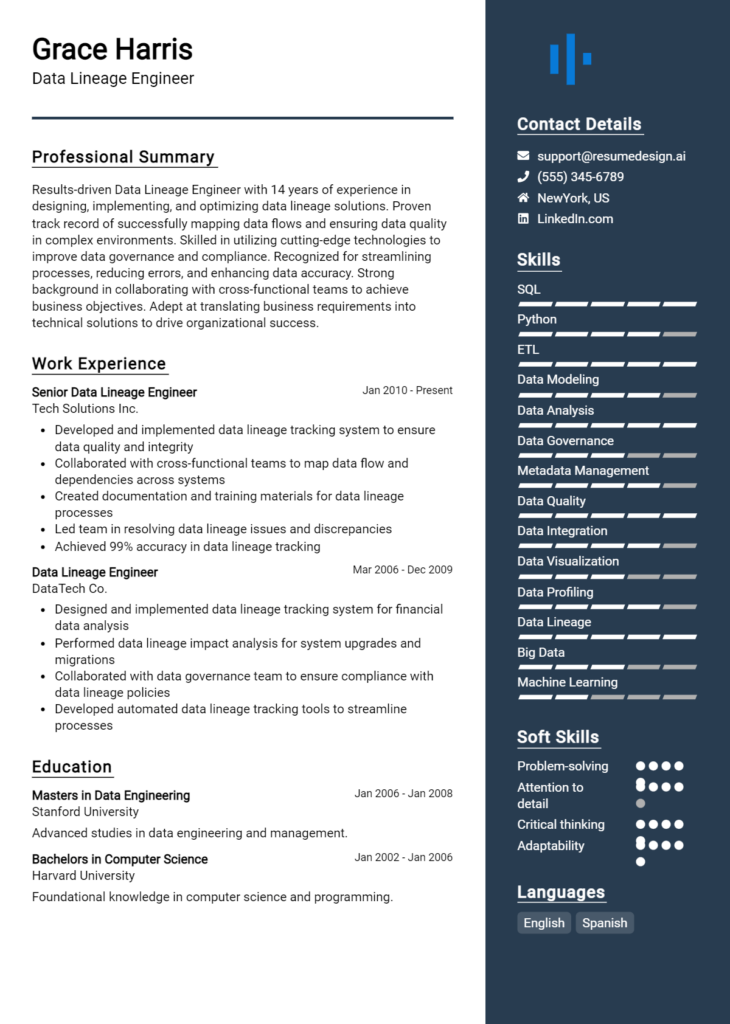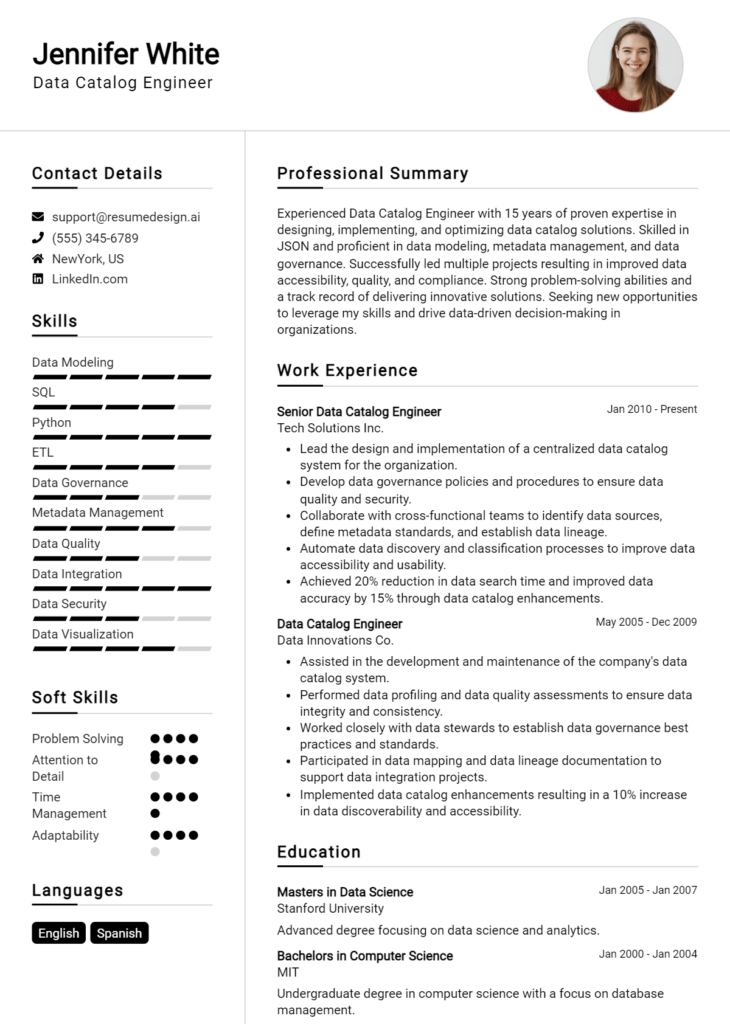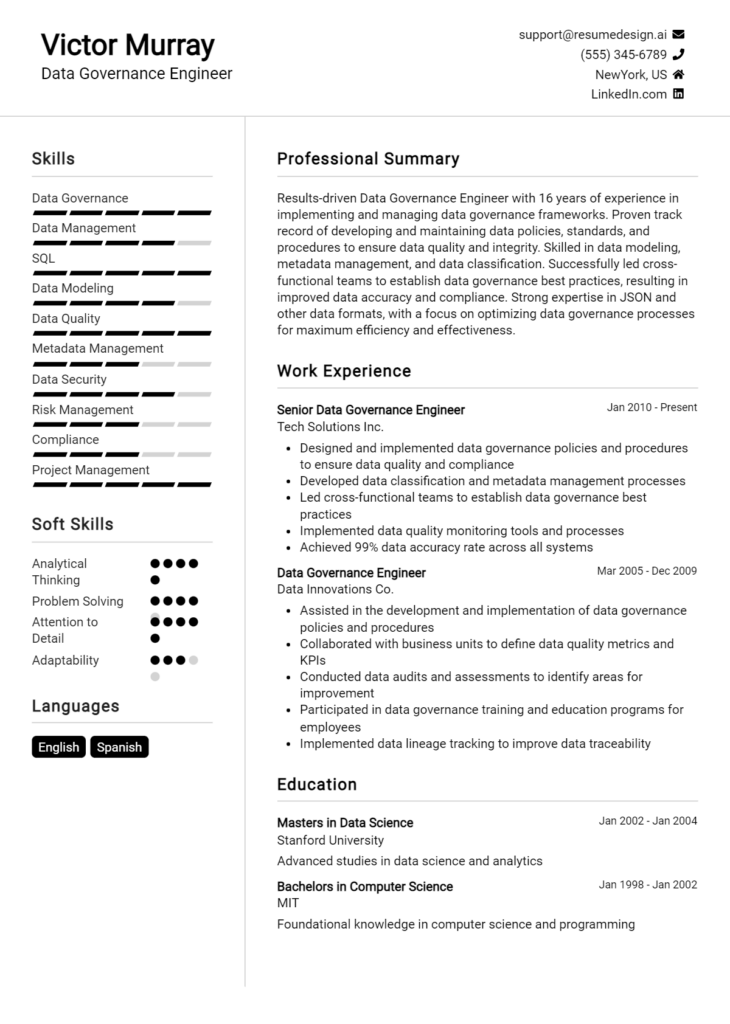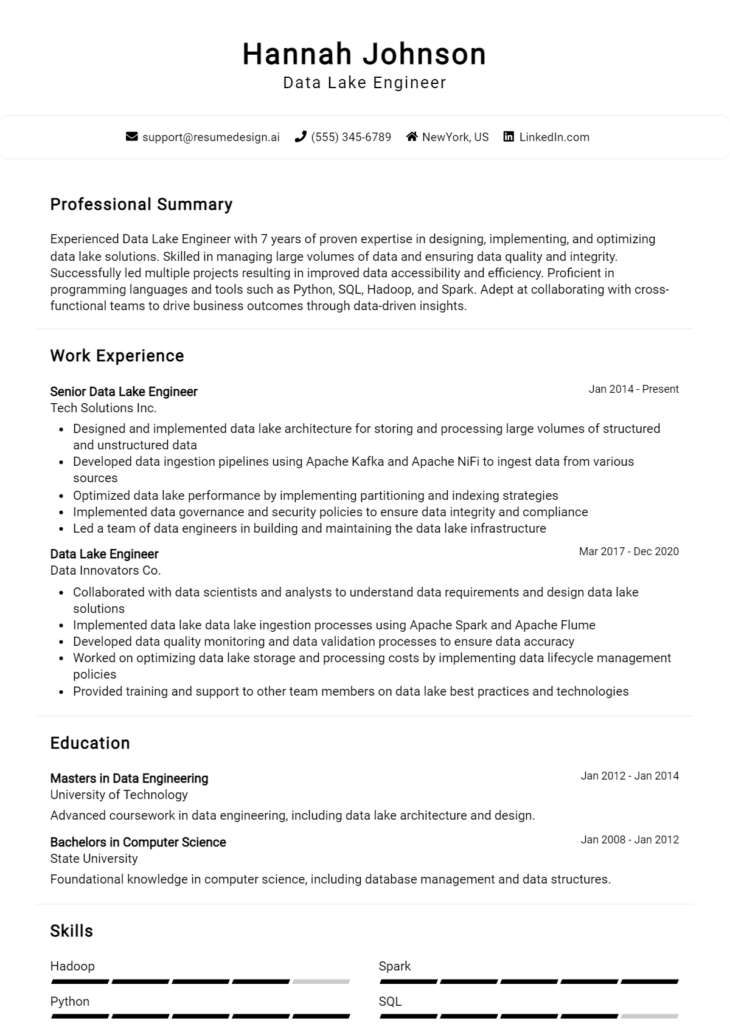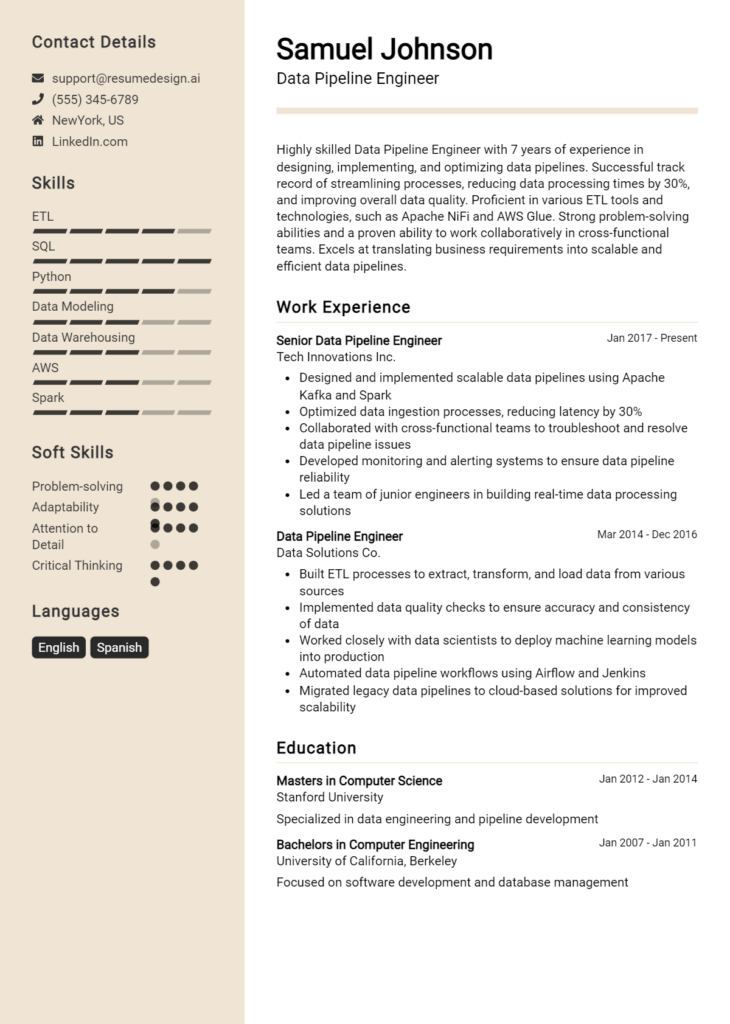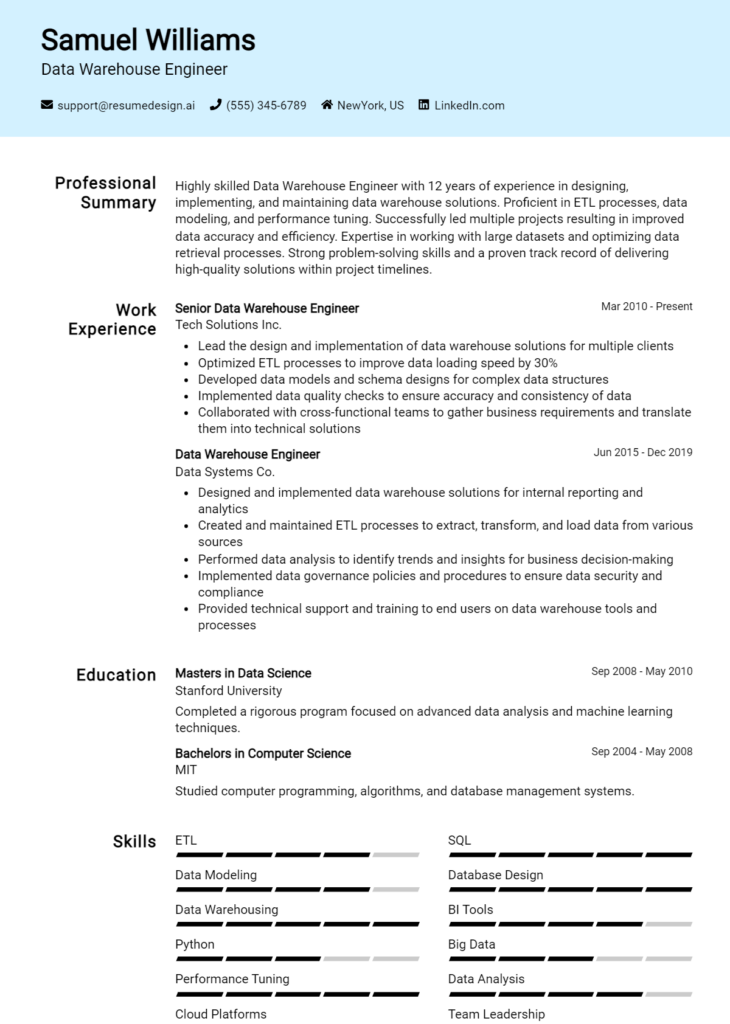Data Lakehouse Specialist Core Responsibilities
A Data Lakehouse Specialist plays a crucial role in integrating data management across various departments, ensuring seamless collaboration between data engineering, analytics, and business intelligence teams. Key responsibilities include designing and implementing data lakehouse architectures, optimizing data storage and retrieval, and ensuring data quality and governance. Essential skills encompass technical proficiency in big data technologies, operational expertise in data workflows, and strong problem-solving abilities. These competencies drive organizational goals by enabling data-driven decision-making. A well-structured resume highlighting these qualifications is vital for showcasing the candidate's value in this specialized role.
Common Responsibilities Listed on Data Lakehouse Specialist Resume
- Design and implement data lakehouse architectures to optimize data storage and processing.
- Collaborate with cross-functional teams to align data strategy with business objectives.
- Manage data ingestion pipelines and ensure data quality and integrity.
- Develop and maintain documentation for data workflows and processes.
- Optimize query performance and data retrieval operations.
- Implement data governance policies to comply with regulatory standards.
- Perform data analysis and reporting to support business insights.
- Monitor system performance and troubleshoot any data-related issues.
- Stay updated on emerging technologies and best practices in data management.
- Provide training and support to team members on data lakehouse tools and processes.
- Evaluate and recommend tools and technologies for data management improvements.
High-Level Resume Tips for Data Lakehouse Specialist Professionals
In today's competitive job market, a well-crafted resume is crucial for Data Lakehouse Specialist professionals seeking to make a lasting impression on potential employers. Your resume is often the first point of contact with hiring managers, and it needs to effectively showcase your skills, qualifications, and achievements in the field of data management and analytics. A standout resume not only highlights your technical abilities but also narrates your professional journey in a way that aligns with the needs of the employer. This guide will provide practical and actionable resume tips specifically tailored for Data Lakehouse Specialist professionals, ensuring you present the best version of yourself to prospective employers.
Top Resume Tips for Data Lakehouse Specialist Professionals
- Tailor your resume to the specific job description by integrating relevant keywords and phrases that match the role.
- Showcase your experience with data lakehouse technologies and platforms, emphasizing your familiarity with tools like Apache Spark, Delta Lake, and cloud services.
- Quantify your achievements by including metrics such as data processing speeds, storage efficiencies, or cost reductions you’ve achieved in previous roles.
- Highlight your understanding of data governance and compliance, as these are critical aspects of managing a data lakehouse.
- Include relevant certifications, such as those from cloud providers or data management organizations, to demonstrate your commitment to professional development.
- Demonstrate your ability to work collaboratively in cross-functional teams, as data lakehouse projects often require input from various departments.
- Use action verbs and concise language to clearly convey your responsibilities and accomplishments in past roles.
- Incorporate a section for technical skills, ensuring it reflects both hard skills (like programming languages) and soft skills (like problem-solving abilities).
- Keep the design clean and professional, using consistent formatting to enhance readability and make a strong visual impact.
By implementing these tips, you can significantly enhance your resume, making it more appealing to potential employers in the Data Lakehouse Specialist field. A targeted and well-structured resume will not only highlight your qualifications but also increase your chances of landing an interview and ultimately securing the job you desire.
Why Resume Headlines & Titles are Important for Data Lakehouse Specialist
In the competitive field of data engineering and analytics, the role of a Data Lakehouse Specialist is crucial for organizations looking to optimize their data management strategies. Resume headlines and titles play a vital role in this context, as they provide a snapshot of a candidate's qualifications and expertise in a single, impactful phrase. A strong headline can immediately capture the attention of hiring managers, setting the tone for the rest of the resume. It should be concise, relevant, and directly aligned with the job description, allowing candidates to effectively communicate their unique value proposition right from the start.
Best Practices for Crafting Resume Headlines for Data Lakehouse Specialist
- Keep it concise: Aim for a headline that is no longer than 10 words.
- Be role-specific: Use keywords that align with the Data Lakehouse Specialist position.
- Highlight key qualifications: Incorporate specific skills or accomplishments relevant to the role.
- Use action-oriented language: Start with strong verbs or adjectives to convey impact.
- Avoid jargon: Ensure the language is clear and accessible to various audiences.
- Tailor for each application: Customize the headline to match the specific job description.
- Include metrics if possible: Quantify achievements to enhance credibility.
- Make it attention-grabbing: Use unique phrasing that stands out from generic titles.
Example Resume Headlines for Data Lakehouse Specialist
Strong Resume Headlines
Data Lakehouse Specialist with 5+ Years in ETL Processes
Certified Data Engineer | Expert in Lakehouse Architecture and Analytics
Data Lakehouse Consultant | Proven Track Record in Data Transformation and Visualization
Weak Resume Headlines
Data Specialist
Experienced Professional Looking for Opportunities
The strong headlines are effective because they convey clear and specific information about the candidate's expertise, experience, and value, making them stand out to hiring managers. They utilize relevant keywords and metrics that resonate with the job requirements. Conversely, the weak headlines fail to impress as they are vague, generic, and do not provide any substantial information about the candidate’s qualifications, making it difficult for hiring managers to assess their fit for the role.
Writing an Exceptional Data Lakehouse Specialist Resume Summary
A well-crafted resume summary is crucial for a Data Lakehouse Specialist, as it serves as the first impression a candidate makes on hiring managers. This brief yet impactful statement quickly captures attention by highlighting key skills, relevant experience, and notable accomplishments tailored to the specific job role. A strong summary not only showcases the candidate’s qualifications but also demonstrates their alignment with the organization’s needs, making it essential for standing out in a competitive job market. By being concise and focused, the summary sets the tone for the rest of the resume and encourages the hiring manager to delve deeper into the candidate's qualifications.
Best Practices for Writing a Data Lakehouse Specialist Resume Summary
- Quantify achievements to demonstrate impact (e.g., "Increased data processing efficiency by 30%").
- Focus on relevant skills specific to data lakehouse technologies and methodologies.
- Tailor the summary to align with the job description and company goals.
- Use industry-specific terminology to showcase expertise and familiarity.
- Highlight key accomplishments that are relevant to data management and analytics.
- Keep it concise, ideally between 3-5 sentences, to maintain clarity.
- Incorporate action verbs to convey a sense of proactivity and results-oriented mindset.
- Showcase soft skills, such as teamwork and communication, that complement technical abilities.
Example Data Lakehouse Specialist Resume Summaries
Strong Resume Summaries
Dynamic Data Lakehouse Specialist with over 6 years of experience in designing and implementing scalable data solutions. Successfully led a team to develop a unified data platform that improved analytics performance by 45%, driving actionable insights for business strategy.
Results-driven Data Lakehouse Expert with a proven track record of deploying ETL pipelines and enhancing data accessibility for cross-functional teams. Achieved a 25% reduction in data retrieval times by optimizing storage architecture, significantly boosting operational efficiency.
Detail-oriented Data Lakehouse Specialist with expertise in cloud-based data storage and analytics. Spearheaded a project that integrated machine learning models, resulting in a 50% increase in predictive accuracy for client outcomes over a 12-month period.
Innovative Data Lakehouse Professional with 8 years of experience in big data technologies and data governance. Played a key role in a data migration project that transitioned legacy systems to a lakehouse structure, reducing costs by 30% while enhancing data quality and accessibility.
Weak Resume Summaries
Experienced in data management and related technologies, seeking opportunities in data lakehouse roles.
Data specialist with some experience in big data technologies. Looking for a position where I can apply my skills.
The strong resume summaries stand out because they provide specific achievements, quantify results, and highlight relevant skills directly related to the Data Lakehouse Specialist role. They articulate clear contributions to past projects, demonstrating the candidate's value to potential employers. In contrast, the weak summaries lack detail and specificity, making them appear generic and failing to convey any measurable impact or relevant expertise. This distinction is crucial for capturing the attention of hiring managers and setting the candidate apart in a competitive job market.
Work Experience Section for Data Lakehouse Specialist Resume
The work experience section of a Data Lakehouse Specialist resume is critical as it provides a comprehensive overview of the candidate's technical skills, leadership capabilities, and ability to deliver high-quality data solutions. This section allows applicants to demonstrate their proficiency in managing complex data environments, coordinating cross-functional teams, and driving projects to successful completion. Quantifying achievements with specific metrics and aligning experiences with industry standards not only enhances credibility but also showcases the candidate's impact on previous organizations. Employers look for tangible results and evidence of collaboration, making this section essential in establishing the applicant's qualifications.
Best Practices for Data Lakehouse Specialist Work Experience
- Highlight specific technical skills relevant to data lakehouse environments, such as cloud services, ETL processes, and data management tools.
- Quantify achievements with metrics (e.g., improved data processing speed by 30%) to demonstrate the impact of your work.
- Use action verbs to convey proactive involvement in projects and initiatives.
- Showcase collaborative efforts, detailing successful teamwork and cross-departmental projects.
- Align experiences with industry standards and best practices to resonate with potential employers.
- Provide context for each role, clarifying the significance of your contributions and responsibilities.
- Keep descriptions concise while ensuring they are informative and impactful.
- Tailor the work experience section for each application to emphasize the most relevant experiences.
Example Work Experiences for Data Lakehouse Specialist
Strong Experiences
- Led a cross-functional team to implement a new data lakehouse architecture that reduced data retrieval times by 40%, improving overall organizational efficiency.
- Developed and executed data governance strategies that increased data accuracy by 25%, enabling better decision-making across departments.
- Managed a project that integrated 10+ disparate data sources into a unified lakehouse platform, enhancing data accessibility for over 200 users.
- Designed and rolled out automated ETL pipelines that decreased data processing costs by 15% and improved time-to-insight for business analytics.
Weak Experiences
- Worked on data projects that involved various tools and technologies.
- Assisted in the management of data-related tasks in a team setting.
- Participated in meetings and contributed to discussions about data solutions.
- Helped with data processing and analysis as part of a larger group effort.
The examples of strong experiences are considered effective because they clearly define the candidate's specific contributions, showcase quantifiable results, and demonstrate technical leadership and collaboration. In contrast, the weak experiences lack detail and measurable outcomes, making them less impactful and failing to convey the candidate's true capabilities or achievements in the realm of data lakehouses.
Education and Certifications Section for Data Lakehouse Specialist Resume
The education and certifications section of a Data Lakehouse Specialist resume plays a crucial role in establishing the candidate's qualifications and expertise in the field. This section not only showcases the academic background of the applicant but also highlights their commitment to continuous learning through industry-relevant certifications and specialized training. Including pertinent coursework, certifications, and any advanced training programs can significantly enhance the candidate's credibility and demonstrate their alignment with the specific requirements of the job role. Employers often look for candidates who possess not only the foundational knowledge but also the latest skills and methodologies in data management, analytics, and lakehouse architecture.
Best Practices for Data Lakehouse Specialist Education and Certifications
- Focus on relevant degrees, such as Computer Science, Data Science, or Information Technology.
- Highlight industry-recognized certifications, such as Databricks Certified Data Engineer or AWS Certified Solutions Architect.
- Include specific coursework related to data engineering, data warehousing, and big data technologies.
- Indicate any specialized training in tools and platforms commonly used in data lakehouses, like Apache Spark or Delta Lake.
- Prioritize certifications that demonstrate expertise in cloud services, data processing, and analytics.
- Keep the format clear and organized to ensure easy readability and quick reference for hiring managers.
- Update the section frequently to reflect new certifications or courses completed to show ongoing professional development.
- Consider including honors or relevant projects that showcase practical application of the learned skills.
Example Education and Certifications for Data Lakehouse Specialist
Strong Examples
- Bachelor of Science in Computer Science, University of Technology, 2020
- Databricks Certified Data Engineer, 2022
- Coursework in Data Warehousing and Big Data Analytics, Online Learning Platform
- AWS Certified Solutions Architect – Associate, 2023
Weak Examples
- Bachelor of Arts in English Literature, University of Arts, 2018
- Certification in Basic Computer Skills, 2019
- Unrelated coursework in Art History and Sociology
- Outdated certification in Microsoft Office Suite, 2020
The strong examples are considered relevant because they reflect educational qualifications and certifications that directly align with the requirements for a Data Lakehouse Specialist. They showcase specialized training and recognized credentials that are crucial for the role. Conversely, the weak examples illustrate qualifications that lack relevance to the field of data management and analytics, failing to demonstrate the specific skills and knowledge necessary for success in a Data Lakehouse environment. This disparity underscores the importance of aligning educational credentials and certifications with the target job role.
Top Skills & Keywords for Data Lakehouse Specialist Resume
In the rapidly evolving field of data management, a Data Lakehouse Specialist plays a pivotal role in bridging the gap between raw data storage and analytical insights. Crafting a compelling resume that highlights both hard and soft skills is essential for standing out in this competitive landscape. Employers seek candidates who not only possess technical expertise but also demonstrate effective communication, problem-solving abilities, and adaptability. By showcasing the right combination of skills in your resume, you can convey your value to potential employers and increase your chances of landing an interview. For more insights on how to effectively incorporate skills into your resume, you can explore skills.
Top Hard & Soft Skills for Data Lakehouse Specialist
Soft Skills
- Effective Communication
- Problem Solving
- Critical Thinking
- Team Collaboration
- Adaptability
- Time Management
- Attention to Detail
- Analytical Mindset
- Creativity
- Conflict Resolution
Hard Skills
- Data Warehousing
- SQL and NoSQL databases
- ETL Processes
- Data Modeling
- Cloud Platforms (AWS, Azure, GCP)
- Apache Spark
- Data Governance
- Business Intelligence Tools
- Machine Learning Basics
- Data Security and Privacy Compliance
Having a well-rounded skill set is crucial for a Data Lakehouse Specialist, as it allows for efficient management and analysis of large datasets while also facilitating collaboration with various teams. By including both soft and hard skills in your resume, you can effectively demonstrate your qualifications and experience. For additional guidance on structuring your work experience, consider how to best highlight relevant projects and achievements that align with these skills.
Stand Out with a Winning Data Lakehouse Specialist Cover Letter
I am writing to express my enthusiasm for the Data Lakehouse Specialist position at [Company Name] as advertised. With a solid background in data engineering and analytics, coupled with extensive experience in lakehouse architecture, I am excited about the opportunity to contribute to your team. My expertise in integrating data lakes and data warehouses has equipped me with the skills necessary to streamline data management and enhance data accessibility, ultimately driving value for the organization.
In my previous role at [Previous Company Name], I successfully led a project that transitioned our data infrastructure from a traditional data warehouse model to a more robust lakehouse architecture. This transition not only improved data processing speeds by 40% but also enabled our analytics team to derive insights from a broader range of data sources, including unstructured data. My proficiency in tools such as Apache Spark, Delta Lake, and cloud platforms like AWS and Azure has been instrumental in optimizing workflows, ensuring data quality, and maintaining compliance with data governance standards.
I am particularly drawn to [Company Name] because of your commitment to leveraging innovative data solutions to drive business outcomes. I am eager to collaborate with your data science and engineering teams to develop strategies that maximize the potential of your data lakehouse infrastructure. My strong analytical skills, combined with my passion for transforming raw data into actionable insights, make me a strong candidate for this role. I am confident that my proactive approach and dedication to continuous learning will contribute positively to your organization.
Thank you for considering my application. I look forward to the opportunity to discuss how my expertise aligns with the goals of [Company Name] and how I can contribute to the success of your data initiatives. I am excited about the possibility of working together to unlock the full potential of your data landscape.
Common Mistakes to Avoid in a Data Lakehouse Specialist Resume
When crafting a resume for a Data Lakehouse Specialist position, it's crucial to present your skills and experiences in a way that aligns with the unique demands of the role. However, there are several common pitfalls that candidates often encounter, which can undermine their chances of landing an interview. Understanding these mistakes can help you create a more effective resume that highlights your qualifications and demonstrates your expertise in data management and analytics.
Neglecting Relevant Skills: Failing to list specific skills related to data lakehouse technologies (like Apache Spark, Delta Lake, or data modeling) can make your resume less appealing to recruiters looking for specialized knowledge.
Overlooking Industry Keywords: Not incorporating relevant industry keywords can lead to your resume being overlooked by Applicant Tracking Systems (ATS), which filter candidates based on keyword matches.
Vague Job Descriptions: Providing generic descriptions of previous roles without quantifiable achievements can make it difficult for employers to gauge your impact and expertise. Specific metrics or outcomes should be included where possible.
Ignoring Tailoring: Using a one-size-fits-all resume instead of tailoring it for the specific Data Lakehouse Specialist position can result in a lack of connection with the job requirements, leaving recruiters unconvinced of your fit.
Inadequate Education and Certifications Section: Not highlighting relevant educational background or certifications, such as those in data science or big data technologies, can diminish your perceived qualifications.
Poor Formatting and Structure: A cluttered or difficult-to-read resume can detract from your professional presentation. Maintaining a clean layout with clear sections helps ensure your information is easily accessible.
Lack of Continuous Learning Evidence: Failing to showcase ongoing education or involvement in the latest industry trends (like attending workshops, webinars, or obtaining new certifications) can signal to employers that you are not committed to professional growth.
Omitting Soft Skills: While technical abilities are vital, neglecting to mention essential soft skills like teamwork, communication, and problem-solving can leave a gap in showcasing your overall suitability for the collaborative nature of data projects.
Conclusion
As we explored the essential aspects of the Data Lakehouse Specialist role, it became clear that proficiency in both data management and analytics is vital for success in this position. Key responsibilities include designing and implementing data lakehouse architectures, ensuring seamless data integration, and optimizing performance for analytics workloads. Moreover, strong knowledge of cloud platforms, data governance, and data security practices is crucial for safeguarding sensitive information while maximizing data accessibility.
In addition to technical skills, effective communication and collaboration are essential, as Data Lakehouse Specialists often work closely with cross-functional teams to drive data-driven decision-making across the organization. Staying updated with the latest trends and technologies in the field will further enhance your value as a Data Lakehouse Specialist.
As you reflect on your qualifications and experiences, consider reviewing your resume to ensure it accurately represents your expertise and aligns with industry expectations. Utilize resources available to you, such as resume templates, resume builder, resume examples, and cover letter templates. These tools can help you craft a compelling resume and cover letter that showcase your skills and make a lasting impression on potential employers. Don't miss the opportunity to elevate your career—take action today!

